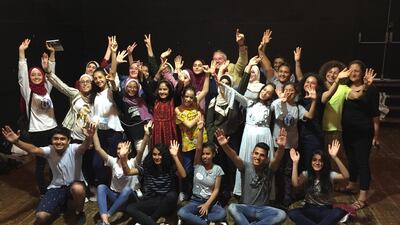A UK-founded charity is helping to connect children living in the blockaded Gaza Strip to connect with the outside world using the age-old medium of storytelling and the latest advancements in technology.
The Hands Up Project, which was created by English language teacher and author Nick Bilbrough, connects classrooms in parts of the Middle East cut off by conflict and poverty.
Mr Bilbrough had the idea for the project during his first trip to Palestine five years ago to teach English to children. It was in Gaza, home to two million people who are blocked off from the rest of the world by Israeli and Egyptian border restrictions, that the teacher was inspired to try and bring an end to the children’s isolation.
"What I found when I first went to Palestine was a lot of teachers doing impressive things in very challenging circumstances. But they lacked the ability to be able to communicate with people outside of their immediate environment," he told The National.
“Most children in Gaza have never left the Gaza Strip. It’s incredibly overcrowded, there’s mass poverty and there’s a stench of sewage everywhere. Yet there are children who speak a very high level of English in spite of the fact they are never able to leave Gaza.”
Mr Bilbrough wanted to give children the opportunity to connect with other people through education so left Palestine with a plan to hold a weekly workshop via video link from his home in Devon, southern England. But when other teachers heard about what Nick was planning, they were curious and wanted to become involved.
Before long, the project, which started with just one man doing an online storytelling workshop to youngsters at a library in Beit Hanoun, Gaza, was a global operation.
Now Hands Up has about 40 volunteers from 40 countries. They connect to groups of children for a one-hour session to take part in creative activities, including storytelling, drama and writing plays.
“We’re not teaching as such because the teachers in Palestine are very competent, we’re just providing a service to those teachers by enabling them to interact with people outside their immediate environment,” Mr Bilbrough said.
“A lot of the volunteers say they’ve never met kids who are so motivated and keen to learn.”
As well as giving children a chance to widen their horizons, the project also shows the children, many of whom will have experienced trauma, that they have not been forgotten by the rest of the world.
Mr Bilbrough remembered one poignant moment when a 14-year-old girl came up to the camera during a storytelling session and told him: “Please tell people that we’re not terrorists.”
About 500 children a week participate in Hands Up, which more recently expanded to reach classrooms in Zaatari refugee camp in Jordan, home to Syrians who have fled conflict.
The project comes with certain challenges – a stable internet connection being the main issue. Hands Up classrooms use Zoom rather than Skype because it is better able to withstand power cuts, a frequent occurrence in Gaza.
Another difficulty is funding. In Gaza and the occupied West Bank, the sessions are conducted mainly in classrooms provided by the United Nations agency for Palestinian refugees.
UNRWA had its American funding withdrawn in 2018 by US President Donald Trump, leaving the organisation with a more than $300 million (Dh1.10bn) shortfall. Despite other nations upping their donations, there is still a fear that many UNRWA-operated schools will have to close.
Hands Up itself runs on donations from private individuals and the organisation hopes to raise enough money this year to allow keen young playwrights to have their work staged at the Palestinian National Theatre in Jerusalem.
The annual competition this year had 180 entries, which are whittled down to 18 finalists. Hands Up then takes them to the West Bank to have their plays performed there.
Taking 18 children on a trip might seem difficult enough, but Hands Up has the added complication of having to apply for permits to leave Gaza, as well as organising food, accommodation and transport.
But for Mr Bilbrough, it is all worth it.
“This is an amazing experience for these kids because they’ve never been out of Gaza. [At the most recent competition] we did a Facebook Live feed of the performances, which people could watch back home in Gaza,” he said.
“I think it brings hope to a lot of people that they do have a chance to share their messages with a wider audience.”


